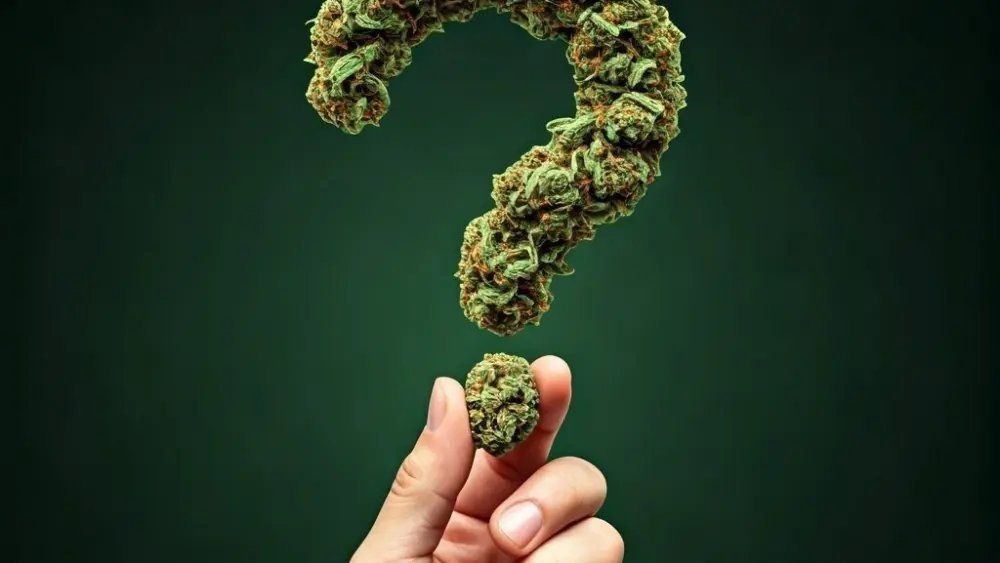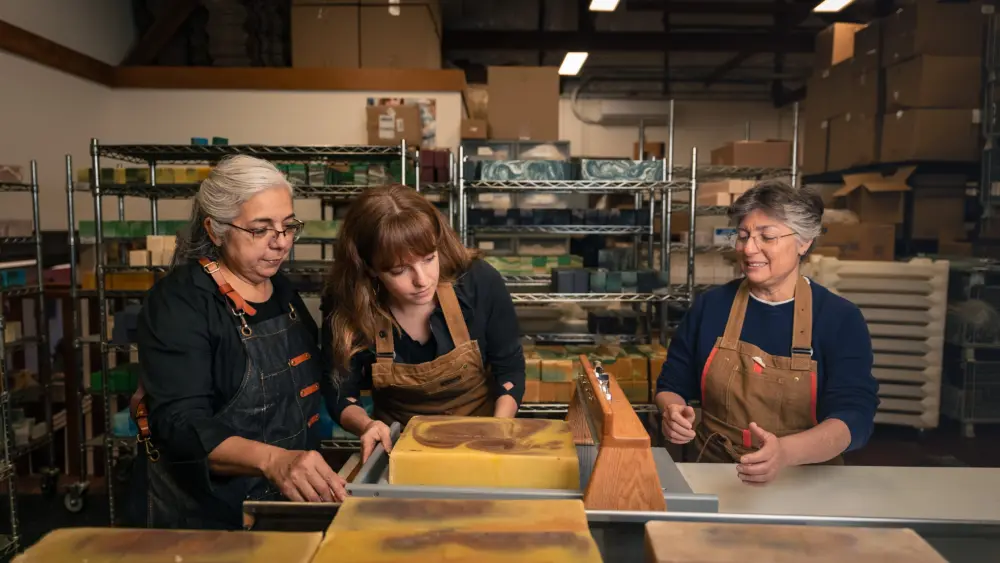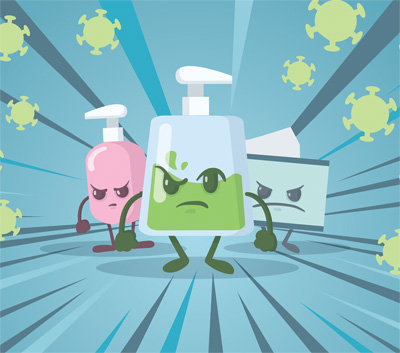
Stay six feet apart. Wash your hands for 20 seconds. Use hand sanitizer. Don’t touch your face!
Those oft-repeated phrases have become the new national mantra. And it explains shelves suddenly depleted of soaps and sanitizing products. Purell, introduced in 1997, is synonymous with hand sanitizer, so it was the first product that came to mind and the first to sell out. Other businesses jumped in to address the void and the public’s concerns about health, safety and the spreading coronavirus. Distilleries in California and around the country rallied to produce an alcohol-based sanitizer. And businesses that make botanical and herbal personal care and wellness products ramped up, too.
Prohibition Spirits Distillery
Fred and Amy Groth first came to Sonoma on vacation in 2008. The ambience and the weather reminded them of Italy, a place they loved. At the time they lived in Boulder, Colo., with hectic careers that required much travel and time away from family, and they dreamed of settling down and starting a business together. Thoughts of Sonoma persisted, so they relocated to wine country and began Prohibition Spirits Distillery. Their first product was the award-winning Limoncello di Sonoma. Now the company offers 30 types of rums, whiskeys, gins, brandies and specialty spirits. At no time, to that point, did the Groth’s California dreamin’ extend to making hand sanitizer.
“I first heard what was happening from my sister in Colorado,” Fred says. “She mentioned people there were hoarding hand sanitizer, toilet paper and Kleenex. I found a sanitizer recipe on the Center for Disease Control’s (CDC) website. It stipulated a minimum of 60 percent alcohol. Being a distiller, we had plenty of that. I made a batch and sent some to her.” Then panic reached California and the rest of the nation. The Alcohol and Tobacco Tax and Trade Bureau (TTB) authorized distilleries to begin production of hand sanitizer to meet demand.
“We had all the ingredients—alcohol, glycerin, and essential oils—so the process wasn’t that difficult,” Fred says. The distillery’s first edition of sanitizer included lime oil and was dubbed “Key Lime Margarita.” It sold in cobalt blue 2-ounce bottles, and three other scented sanitizers followed—Piña Colada, Old Fashioned and Lemon Drop Martini. When inventory of smaller bottles began to run low, the company added a larger, more economical 6-ounce size. And though the names conjure up images of a refreshing cocktail, the label clearly states the product is not for human consumption, just to be clear.
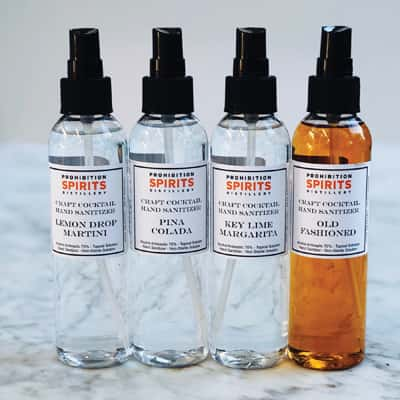
Prohibition Spirits initially sold its sanitizers at its Cornerstone tasting room. The welcoming venue combines the décor of a 1920s-era speakeasy with the vibrancy of pre-coronavirus Italy. A colorful mural on the wall portrays the Italian countryside. Sitting astride the 1972 yellow Vespa scooter situated on-site and holding a glass of yellow Limoncello makes for a memorable photograph. “We spread the word online about the sanitizer, and customers came,” Fred says. A few weeks later, tasting rooms, restaurants and non-essential businesses closed. Prohibition Spirits shifted sales to its distillery on the outskirts of Sonoma. “Fortunately we didn’t have to lay off any of our tasting room staff. They stepped in to help out with sanitizer production, orders and shipping.” The first day, 40 customers showed up at the 21877 8th St. East location. Hand sanitizers are displayed at the open warehouse bay door. Stainless steel distillery vats loom in the background, and wooden barrels line the walls. Customers drive up weekdays between noon and 3:00 p.m., and they’re greeted by a member of the Prohibition Team, ready to fill their order.
Regular updates on the website keep customers informed and are indicative of the pace. “We have a limited amount of personal hand sanitizer…only order what you need… additional stock released daily…priority production goes to hospitals and first responders…we’re working nonstop to get everyone product… thank you for your patience.”
The distillery is still cranking out spirits, of course. Three times during the year, Prohibition sends bottles of selected spirits along with a cocktail recipe to its club members. An onsite launch event usually follows. “Unable to gather this past March, we decided to try Zoom. We sent out the three bottle allotment ahead of time along with the recipe and a free hand sanitizer,” Fred says. “To my surprise, about 30 members participated, even more than usual. Seems they wanted to experience a sense of normalcy.”
Over the past month, Prohibition Spirits shipped 13,000 bottles of sanitizer. Customer orders and the demand has enabled the distiller to provide sanitizer to those on the front lines helping others—the county agency workers, first responders and hospitals.
Fred never thought hand sanitizer would be part of the company’s long-term plans. “Being a small distiller, we were able to ramp up quickly and help out. I am hoping that bigger companies will soon be ramping up, too. Hopefully, by then we’ll be back to happier times, sipping cocktails.”
EO Products
Located in San Rafael, EO Products is the producer of several of the top natural hand sanitizers sold, through its EO and Everyone lines. The company offers an essential collection of personal care products made with active botanicals and always scented with pure essential oils. Co-founders and Co-CEO’s Brad Black and Susan Griffin-Black began the business stirring a stockpot of shower gel in their San Francisco garage in 1995. From that modest beginning, EO Products currently employs 150 workers in its 45,000-square-foot production facility, once home to George Lucas’ “Star Wars” studio.
The company’s products can be found on the shelves of most large retailers—Target, Walmart, Walgreen’s, Whole Foods and Albertsons to name a few—and are available via Amazon and other online channels. The myriad of products available for hands, bath, body and hair incorporate essential oils that promote self-care through aromatherapy. In 2012, EO launched its Everyone brand—providing approachable body care for the whole family in scents made from familiar essential oils and extracts.
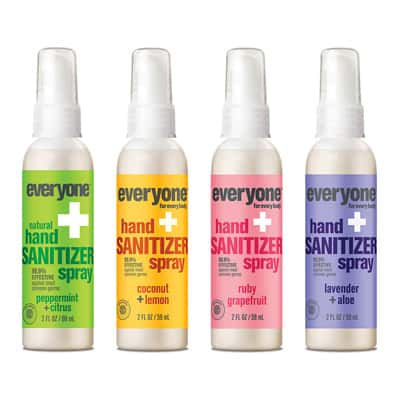
“We began to see a spike in hand sanitizer demand in late January,” Griffin-Black says. “Over just a one week period in mid-February, we saw orders increase 1,300 percent for the Everyone brand on our website. That didn’t include sales at the nationwide retailer level. This was a clear indication of things to come.” EO sanitizers became difficult to find at most store locations at the end of March, and ‘sold out’ tags appeared on the digital links. The company increased capacity, reached deeper into its supply chain and fast-tracked plans to partner with a co-manufacturer.
The company was granted an exemption from California’s statewide mandatory, stay-at-home order. The exemption allowed the company to continue producing products to protect public health during the COVID-19 crisis. “We are grateful to serve the nation during this uncertain time,” Griffin-Black says. Before COVID-19, seven warehouse production lines produced a range of products from shampoo to deodorant to lotions. Today, the company is exclusively running hand sanitizer and hand soap. “Those are our priority products,” says Griffin-Black.
Ingredients are sourced from an extensive network of partners. “We’re leveraging relationships we’ve built over the past 25 years and scaling raw material availability as much as possible,” Griffin-Black says. “We’re increasing order fulfillment capabilities, running extra shifts, speeding up production lines and hiring temporary workers.” In addition, EO Products reduced the number of scents and size availability to realize greater operating efficiencies.
“The well being of our team is, and always will be, primary. The warehouse is sanitized frequently and cleaned between shifts,” says Griffin-Black. “And additional measures have been introduced to ensure employee safety and health. We developed a questioning framework that follows each day. Employees go through the questionnaire in-person with their supervisor, or it’s sent to employees working remotely. The questions cover physical and mental health.”
Along with fulfilling customer requirements, EO Products is committed to ensuring public health and safety. To address these issues, the company partnered with the City and County of San Francisco. More than 8,000 units of various sanitizing products were shipped to the Moscone Center, now serving as San Francisco’s Emergency Response Center. Community organizations in San Rafael and Marin have also been provided with much needed sanitizing supplies.
Griffin-Black thinks the practice of washing hands thoroughly has become ingrained due to COVID-19. “Washing hands and using sanitizers are going to become as much a part of one’s personal health routine as brushing your teeth,” she says. “We’re here to help people keep themselves and their loved ones healthy, and safe.”
KM Herbals
Similar to others at the time, Kim Manley, founder and creator of KM Herbals, didn’t sense the tidal wave of hand sanitizer demand looming on the horizon. “I got a call from a friend who runs a pre-school in San Francisco. Their parents began calling to ask if the school was using hand sanitizer,” Manley says. “All our products are made to order, so I made a batch and sent it to the her.”
Manley began learning about herbs and essential oils in 1980 at the California School of Herbal Studies, working alongside leading herbalist and wellness experts. She’s a practicing herbalist; massage therapist; aroma therapist; flower essence practitioner; Reiki practitioner; and celebrated educator. Her enthusiasm for formulating personal care and wellness products developed while pregnant with her daughter, Bonnie Rose Campbell. “I was concerned about the harsh chemicals used in mainstream baby care products. I created my own that were natural, gentle and soothing,” says Manley.
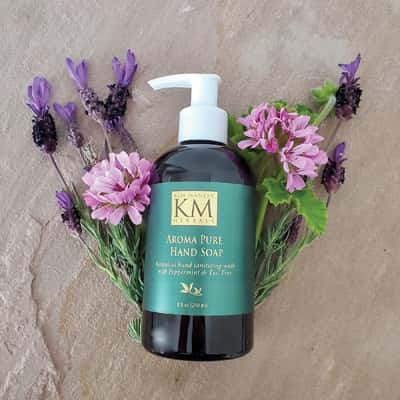
That became the genesis of KM Herbals. Now, Campbell is the company’s director of marketing and outreach. “I grew up running around the company warehouse, wanting to help even from a young age,” Campbell says. “I’ve been fortunate to give back to the business that sustained myself and my family. And even more rewarding is the collaboration with my mother. I have only gained more respect for her as an entrepreneur, a visionary and a woman.”
The San Francisco pre-school teacher’s query led to the March launch of three new wellness products that specifically address the COVID-19 risk. “From the moment the potential impact of the virus was understood, the KM team knew this needed to be a company priority,” Campbell says. “Kim reminded us that our products help people, it’s what we do. Her conviction and determination to produce something special that would be readily accessible and address the coronavirus need, it inspired our team to make that happen.”
Previously, KM Herbal’s business model consisted of private label sales of its 250 products to doctors, salons and spas. The new products—Aroma Hand Sanitizer Plus, Aroma Purifying Spray and Aroma Pure Hand Soap—as well as a collection of their favorite products, are available to the local community online. “Formulas for the three include organic grape (ethyl) alcohol blended with naturally anti-bacterial and anti-microbial essential oils such as rose geranium, lemongrass, lavender and several others. The ingredient common to all three is tea tree oil,” Manley says. That essential oil comes from Australia and is not to be confused with the plant of the same name that’s used to make black, green and oolong teas. Aborigines have used tea tree oil in traditional medicines for centuries. It contains a number of compounds, such as terpinen-4-ol, that possess antibacterial, antiviral and antifungal qualities. The oil also appears to increase the activity of white blood cells, which help fight germs and other foreign invaders.
Located in the town of Dillon Beach, KM Herbals’ home is a 6,000-square-foot facility situated on 200 breathtaking acres that stretch along the coast. Ingredients for products are sourced from KM’s permaculture garden and from wild harvesting as well as quality local and international sourcing. “Our warehouse is quite large. Our 12 employees have their own stations so social distancing wasn’t a problem,” Manley says. “Yet when statistics showed the spread COVID-19 accelerating, I decided to implement shelter-in-place so employees could be with their families. All our products are fresh, made to order. So for now, I do the blending, bottling and prepare shipments. It’s a lot like when I first started 28 years ago,” Manley says with a laugh. “And that’s okay. I’m glad we’ve been able to help out in these difficult times.”
A bridge to normalcy
When life settles and the coronavirus is no longer a looming threat, there are parts of the national mantra that will not easily be forgotten. Wash your hands. Use hand sanitizer. For a while, we will probably be cautious until new rules of social greeting evolve. When do we shake a hand, give a hug, fist–bump or smile and wave?
But in the meantime, three local companies pivoted as the magnitude of this crisis became apparent. EO Products, with a nationwide network and diverse range of offerings, shifted the majority of its manufacturing lines to hand sanitizer and soaps. Overnight, Prohibition Spirits began producing and selling hand sanitizer from its distillery. And KM Herbals, a personal care private label business, created three new retail products to address the coronavirus risk. In this unprecedented time of need, these businesses rallied to provide for their customers—and their community.



